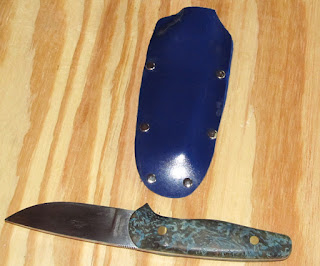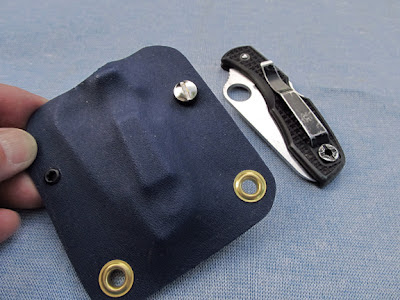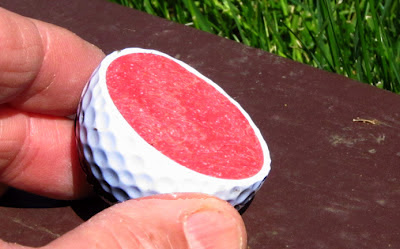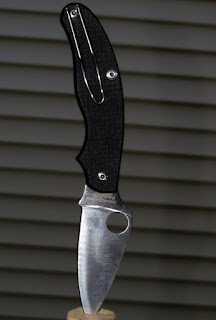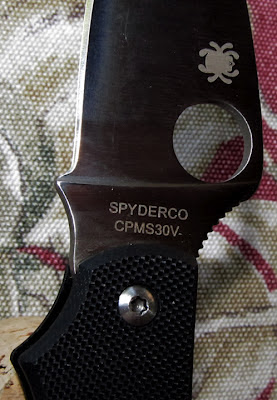I spent a good part of my high school experience stocking shelves for an independent grocery store. I was in charge of filling the beer cooler, sorting the returned glass soda and beer bottles (Yes, we were recycling then, but we didn’t call it recycling. We called it getting our deposit back.) and making sure the shelves had product on them. The store provided a white apron, if we wanted it, a price stamp and a box cutter. The status item among the stock boys was the box cutter.
A box cutter is a simple tool consisting of a frame to hold a single edge safety razor and a flattened metal tube which held the frame shut and could be slid forward to protect you from the razor blade.
.
Even then, some product lines had sales reps whose job was to make sure their product was displayed properly and utilized all the shelf space available, especially if they could steal space from their competitor.
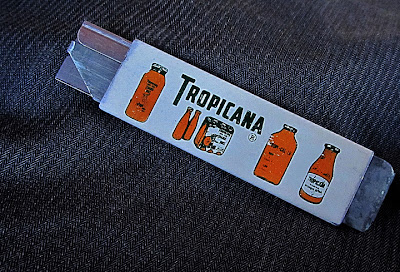 |
| A good score for a stock boy! |
Sometimes if you were especially helpful or they felt expansive (a big dose of flattery helped) they would give you a box cutter with a product logo on one side.
In those simpler times or at least to our simpler concerns, that was a high status item. The store preferred you leave your box cutter at work so it would be available and not forgotten at home. You never left your high status cutter at work. Never!
At the last WRCA Dover knife show, I found an old box cutter from W.T. Rogers Co. in Madison Wis. An internet search produced a copy of a lawsuit which indicated Rodgers made plastic office trays. Later W.T. seems to have been absorbed by Newell Rubbermaid.
 |
| W. T. Rodgers boxcutter. I thought I would cut a finger off trying to get the razor blade in it. |
The cutter is pretty simple, just a folded piece of aluminum metal with cutouts. The razor slips into the frame by way of the cut outs and is slid out to cut. This cutter gave this old stock boy the jitters. I see that blade cracking and blood everywhere. The cutter comes with a nice plastic case colored red, blood red. I don’t think the color was chosen on purpose, but you need the case. If you drop this cutter without the case into a pocket the blade will inch open and you’ll soon need new pants and band-aids.
 |
| I got it open without cutting myself. I'm sure you could cut cardboard and fingers with the same effort. |
I also got another box cutter at Lincoln Electric from my former boss, Jeff. It’s a nice one, made from heavy gauge metal. It’s hard to think of product improvement for a box cutter, but this one has a little groove in the flattened handle and a bump on the frame which prevents the frame from being pulled out forward.
 |
| A sturdy, well made box cutter. It will give you years of cardboard cuttin' fun. But it doesn't have the flash and jazz the Tropicana cutter has. |
You use a cutter by dragging the blade backward through cardboard or plastic. If the frame is too loose and the blade catches, the cutter could pull apart. Very unprofessional. And at Lincoln it means lost productivity while you reassemble your tools. Bad Ju-Ju.
What’s a utility knife but a box cutter on steroids? The industrial strength razor blade usually sits in a moveable frame which locks into several pre-determined positions. The handle is usually stout enough to hold a few extra blades and can take a lot of hand pressure. I’m constantly putting mine in a safe place. So safe that I can’t find them. So the last time I bought one I got a bright orange. I can find this one.
 |
| Its bright orange and I can always find it, at least by the time the job is finished. |
At one time it was promoted by several knife writers as the perfect camping knife. Razor sharp, essentially a fixed blade, one handed operation, no need to resharpen - you change blades when dull; it was almost the perfect camping knife. Except the blade is too small, too fragile, too hard to clean (you trim a raw steak and see how easy it is to clean!). Just the wrong application for the tool.
But it does share some of the attributes of a tactical knife. One handed operation, the blade locks open, it’s very sharp and easy to hold and you can cut people with it.
Is it any wonder the “Stanley” as the British papers call it, is vilified in the British press and provides grounds for arrest if the police find one on you. Oh sure, you can argue that as a glazier or rug installer you need one, but you and your employer need to come before a judge and explain it. And if the judge doesn’t think you should have two with different blades, or that he just doesn’t think you need one at all, well, too bad.
Of course in this labor-saving day we can’t spend time sliding the blade out of the handle. That might take 1.5 seconds. We could save 1/10 of a second with an assisted opening one.
 |
| My co-worker carries this one. Let's see: assisted opening, locks open, has a pocket clip so it stays where you put it. Hey! It's Tactical! If it was black it would be a tactical box opener. |
The razor blade clips in and the opening is spring assisted. For my hands the opening stud is in the wrong place. It’s not a very smooth opener either. Not as smooth as my Benchmade, or my Spyderco, but smoother than my Hartville utility knife. Get caught with this little guy in England and you better be on the job opening boxes. Come out of a pub with one and you might find SWAT (or the English equivalent - SAS?) waiting for you.
Of course all of this starts with a razor blade.
 |
| Single edge safety razor blade. |
In my more impressionable years I read of a fighting technique that used a safety razor blade with a match stick through the center hole. You carried the blade between the fingers with the blade facing outwards from your palm. The match stick prevented the blade from sliding backward when you slapped and cut your opponent. I remember (don’t ask me how) this was reported as the favorite technique in the black quarters of New Orleans.
 |
| What a hairball idea! |
Of course I tried it right away. I couldn’t keep the stick in place, the razor kept falling out and I was convinced I would be the only one cut with it. That was my introduction to “all knife writers are pathological liars.”
That knowledge has served me well.

